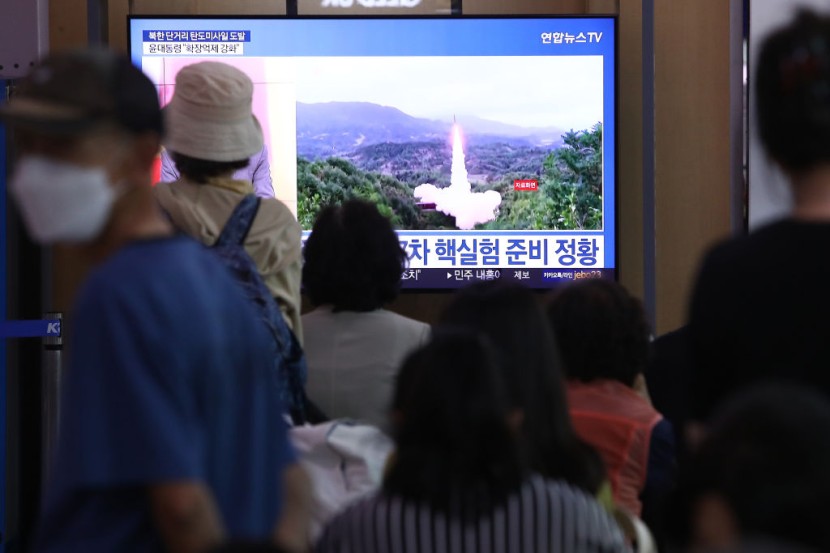
North Korea launched a ballistic missile into the sea off its east coast on Saturday ahead of military exercises and a visit by US Vice President Kamala Harris.
According to South Korea's military, it was a single, short-range ballistic missile that was launched just before 7 a.m. local time from a location close to the Taechon region of North Pyongyang Province and traveled around 600 km (373 miles) at a height of 60 km and a speed of Mach 5. per a CNBC report.
"North Korea's launch of a ballistic missile is an act of grave provocation that threatens the peace and security of the Korean peninsula and international community," South Korea's Joint Chiefs of Staff said in a statement.
Kim Seung-kyum, the chairman of the Joint Chiefs of Staff, and Paul LaCamera, the commander of U.S. Forces Korea, talked about the launch and stressed their readiness to respond to any threat or provocation from North Korea.
Yasukazu Hamada, Japan's defense minister, claimed it reached 50 kilometers and may have flown irregularly. Hamada claimed it was beyond Japan's exclusive economic zone and there were no maritime or air traffic difficulties.
Experts say many of North Korea's short-range missiles are designed to elude missile defenses by rotating in flight and flying on a lower, "depressed" trajectory.
Hamada claimed Japan protested at North Korea's Beijing embassy.
In a statement following the launch, US Indo-Pacific Command said it was aware of the launch and talking with allies. It reaffirmed the US commitment to South Korea and Japan's defense.
The missile launch "does not pose an immediate threat" to US personnel, territory, or allies, but it underlines the "destabilizing impact" of the DPRK's "unlawful weapons of mass destruction" and ballistic missile capabilities, the combatant command noted.
The launch occurs as the nuclear-powered USS Ronald Reagan arrives in South Korea to take part in joint exercises with South Korean forces and before Harris's trip to Seoul this week.
What Will Happen During Kamala Harris' Trip?
Vice President Kamala Harris will join a dozen US officials in Japan for the burial of former Prime Minister Abe Shinzo before flying to South Korea, per Spectrum News1.
The primary objective of the travel is to pay respects to the late Japanese leader, but senior administration officials said Friday that the group also looks forward to a "busy and productive visit" covering many vital matters for the US and its friends and partners.
VP Harris will arrive in Tokyo on Monday with U.S. Ambassador Rahm Emmanuel, US Trade Representative Katherine Tai, and Sen. Bill Hagerty, R-Tenn.
Harris will meet with foreign leaders throughout her tour, including Japan's Prime Minister Fumio Kishida. On Tuesday, she'll meet Australia's Anthony Albanese and South Korea's Han Duck-soo before heading to Korea on Thursday.
In Korea, Harris will meet with President Yoon Suk-yeol to "highlight the strength of the U.S.-ROK Alliance and discuss the threat posed by the DPRK, the importance of peace and stability across the Taiwan Strait, and our growing economic and technology partnership," senior administration officials said.
China views Taiwan as its sovereign territory, has not ruled out military force to reunify it with the mainland, and has stepped up military activities in the area.
North Korea May Launch Its Nuclear Test During Harris' Indo-Pacific Trip
Pyongyang may soon undertake its sixth nuclear test, the first since 2017. The Japan Times reported that a senior White House official told reporters Friday that a nuclear test or other provocation is likely during Harris' visit, but they have no estimates or pronouncements.
Leif-Eric Easley, a professor at Ewha University in Seoul, said Kim Jong Un may be delaying a nuclear test "out of respect" for China's Communist Party meeting next month, where Xi Jinping is anticipated to prolong his leadership term. However, Easly said Pyongyang's self-restraint has limitations.
"The Kim regime sees itself in an arms race with South Korea and may be looking to make up for lost time after its pandemic struggles," he noted.
Related Article : Moscow-Controlled Areas in Ukraine Start Referendum on Joining Russia Amid International Criticism








